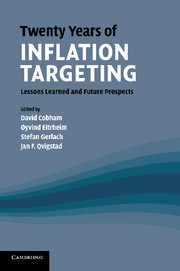Book contents
- Frontmatter
- Contents
- List of figures
- List of tables
- List of contributors
- 1 Introduction
- 2 Welcome remarks: a Norwegian perspective
- 3 Reflections on inflation targeting
- 4 Inflation targeting at twenty: achievements and challenges
- 5 Inflation targeting twenty years on: where, when, why, with what effects and what lies ahead?
- 6 How did we get to inflation targeting and where do we need to go to now? A perspective from the US experience
- 7 Inflation control around the world: why are some countries more successful than others?
- 8 Targeting inflation in Asia and the Pacific: lessons from the recent past
- 9 Inflation targeting and asset prices
- 10 The optimal monetary policy instrument, inflation versus asset price targeting, and financial stability
- 11 Expectations, deflation traps and macroeconomic policy
- 12 Heterogeneous expectations, learning and European inflation dynamics
- 13 Inflation targeting and private sector forecasts
- 14 Inflation targeting, transparency and inflation forecasts: evidence from individual forecasters
- 15 Gauging the effectiveness of quantitative forward guidance: evidence from three inflation targeters
- 16 Macro-modelling with many models
- 17 Have crisis monetary policy initiatives jeopardised central bank independence?
- 18 Inflation targeting: learning the lessons from the financial crisis
- 19 The financial crisis as an opportunity to strengthen inflation-targeting frameworks
- 20 ‘Leaning against the wind’ is fine, but will often not be enough
- 21 Inflation targeting, capital requirements and ‘leaning against the wind’: some comments
- Index
19 - The financial crisis as an opportunity to strengthen inflation-targeting frameworks
Published online by Cambridge University Press: 05 October 2010
- Frontmatter
- Contents
- List of figures
- List of tables
- List of contributors
- 1 Introduction
- 2 Welcome remarks: a Norwegian perspective
- 3 Reflections on inflation targeting
- 4 Inflation targeting at twenty: achievements and challenges
- 5 Inflation targeting twenty years on: where, when, why, with what effects and what lies ahead?
- 6 How did we get to inflation targeting and where do we need to go to now? A perspective from the US experience
- 7 Inflation control around the world: why are some countries more successful than others?
- 8 Targeting inflation in Asia and the Pacific: lessons from the recent past
- 9 Inflation targeting and asset prices
- 10 The optimal monetary policy instrument, inflation versus asset price targeting, and financial stability
- 11 Expectations, deflation traps and macroeconomic policy
- 12 Heterogeneous expectations, learning and European inflation dynamics
- 13 Inflation targeting and private sector forecasts
- 14 Inflation targeting, transparency and inflation forecasts: evidence from individual forecasters
- 15 Gauging the effectiveness of quantitative forward guidance: evidence from three inflation targeters
- 16 Macro-modelling with many models
- 17 Have crisis monetary policy initiatives jeopardised central bank independence?
- 18 Inflation targeting: learning the lessons from the financial crisis
- 19 The financial crisis as an opportunity to strengthen inflation-targeting frameworks
- 20 ‘Leaning against the wind’ is fine, but will often not be enough
- 21 Inflation targeting, capital requirements and ‘leaning against the wind’: some comments
- Index
Summary
The topic we have been asked to address is ‘Inflation targeting: where do we go from here?’. Based on the observation that inflation-targeting countries were not spared from the fall-out of the current financial crisis, a frequent reaction to questions of this type has recently been to argue that the inflation-targeting framework is fundamentally flawed and needs to be replaced (see, for example, Wolf 2009).
Although he does not subscribe to this view, are Jonung pointed out at the conference that, in a historical perspective, regime changes tend to happen as the result of crises, suggesting that inflation-targeting frameworks may come under pressure as a result of the financial crisis we are currently experiencing. For those of us who believe that targeting inflation is still the central role of monetary policy, the challenge is therefore to ensure that this pressure does not lead to abandoning the framework altogether but, rather, to improvements in its implementation.
Crises may lead to questions about the validity of the status quo, but they do not necessarily bring about regime change. To illustrate how they may in fact be taken as an opportunity to implement constructive reforms, I find it instructive to review how the monetary authorities in Hong Kong have dealt with crises affecting its currency board system.
- Type
- Chapter
- Information
- Twenty Years of Inflation TargetingLessons Learned and Future Prospects, pp. 428 - 433Publisher: Cambridge University PressPrint publication year: 2010



